-
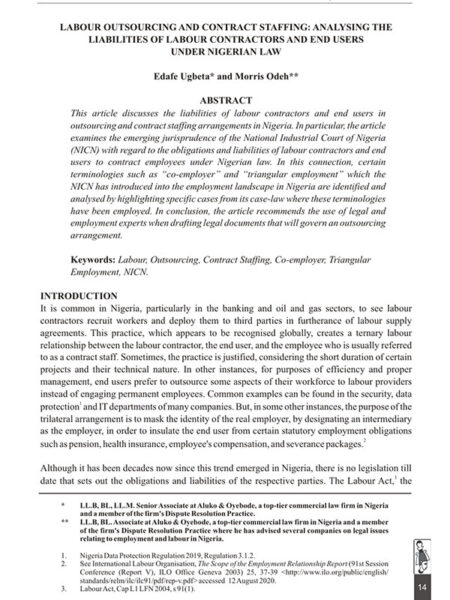
Labour Outsourcing and Contract Staffing: Analysing the Liabilities of Labour Contractors and End Users under Nigerian Law
0₦2,500.00Edafe Ugbeta and Morris Udeh of Aluko & Oyebode in their article, Labour Outsourcing and Contract Staffing: Analysing the Liabilities of Labour Contractors and End Users under Nigerian Law, >observe that generally, parties are bound by their contract, and the law does not permit the courts to alter or rewrite the terms and conditions freely agreed by the parties. However, recent decisions of the National Industrial Court of Nigeria suggest that the court may now hold end-users of labour and parent companies liable to adhere to statutory employment obligations relating to pensions, insurance, tax, health and compensation where the court considers that the labour contractor or subsidiary is a mere sham, agent, tool, or employee of the end-user/parent company for purposes of masking the identity of the real employer.
-
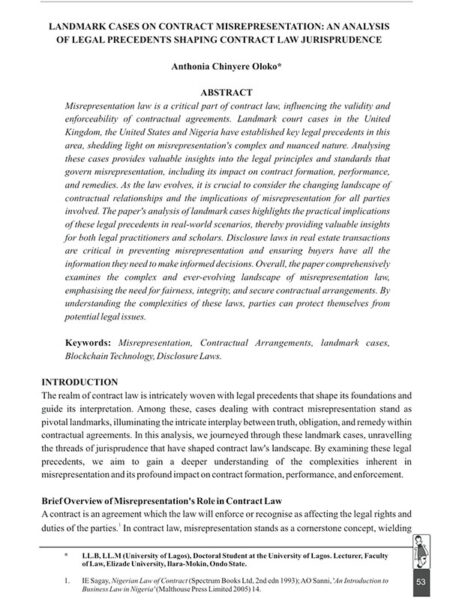
Landmark Cases on Contract Misrepresentation: An Analysis of Legal Precedents Shaping Contract Law Jurisprudence
0₦2,500.00Anthonia Chinyere Oloko, in her article, Landmark Cases on Contract Misrepresentation: An Analysis of Legal Precedents Shaping Contract Law Jurisprudence, visits the law on misrepresentation as a critical part of contract law, influencing the validity and enforceability of contractual agreements. Landmark court cases in the United Kingdom, the United States and Nigeria have established key legal precedents in this area, shedding light on the complex and nuanced nature of misrepresentation. Analysing these cases provides valuable insights into the legal principles and standards that govern misrepresentation, including its impact on contract formation, performance, and remedies. As the law evolves, it is important to consider the changing landscape of contractual relationships and the implications of misrepresentation for all parties involved. The paper’s analysis of landmark cases highlights the practical implications of these legal precedents in real-world scenarios, thereby providing valuable insights for both legal practitioners and scholars. Disclosure laws in the realm of real estate transactions are critical in preventing misrepresentation and ensuring that buyers have all the information they need to make informed decisions. Oloko provides a comprehensive examination of the complex and ever-evolving landscape of misrepresentation law, emphasising the need for fairness, integrity, and secure contractual arrangements. By understanding the complexities of these laws, parties can protect themselves from potential legal issues.
-
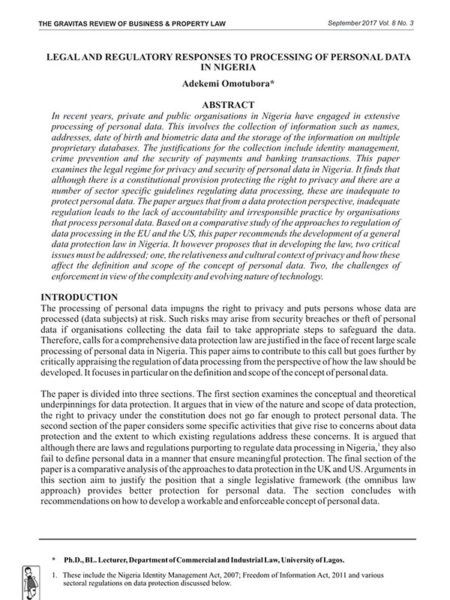
Legal and Regulatory Responses to Processing of Personal Data in Nigeria
0₦2,500.00Dr. Adekemi Omotubora, Lecturer, Department of Commercial and Industrial Law University of Lagos, in her article, “Legal and Regulatory Responses to Processing of Personal Data in Nigeria”, considers the justifications for collection of personal data which include identity management, crime prevention and the security of payments and banking transactions. She argues that although there is a constitutional provision protecting the right to privacy and there are a number of sector specific guidelines regulating data processing, there is no general data protection law in Nigeria, and this leads to a lack of accountability and irresponsible practice by organisations that process personal data. Based on a comparative study of the approaches to regulation of data processing in the EU and the US, she recommends the development of a data protection law in Nigeria, such law taking into consideration the relativeness and cultural context of privacy, and how these affect the definition and scope of the concept of personal data.
-
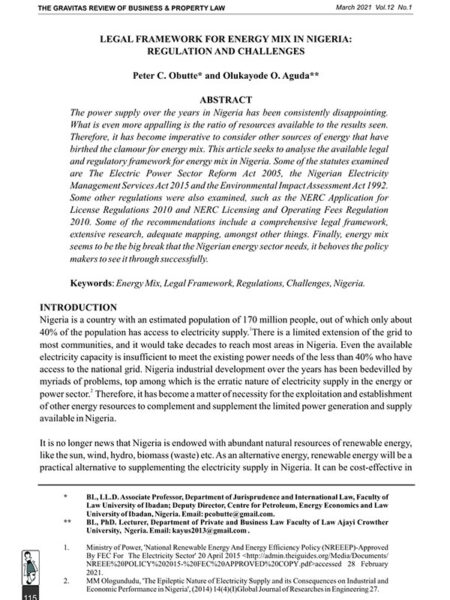
Legal Framework for Energy Mix in Nigeria: Regulation and Challenges
0₦2,500.00Dr Peter Obutte, Associate Professor, Faculty of Law, University of Ibadan and Dr Olukayode Aguda of the Faculty of Law, Ajayi Crowther University, in their article, Legal Framework for Energy Mix in Nigeria: Regulation and Challenges, note that energy mix refers to the combination of the various primary energy sources used to meet energy needs: fossil fuels (oil, natural gas and coal), nuclear energy, and renewable energy sources. Dr Obutte and Dr Aguda analyse the legal and regulatory framework for energy mix in Nigeria. They posit that energy mix seems to be the big break that the Nigerian energy sector needs, and it behooves the policymakers to see it through successfully with a comprehensive legal framework, extensive research and adequate mapping, amongst other things.
-
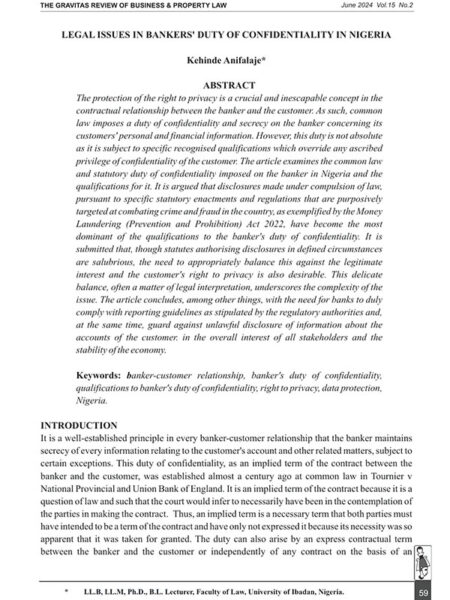
Legal Issues in Bankers’ Duty of Confidentiality in Nigeria
0₦2,500.00Dr. Kehinde Anifalaje, in his article, Legal Issues in Bankers’ Duty of Confidentiality in Nigeria, examines the common law and statutory duty of confidentiality imposed on the banker in Nigeria and the qualifications thereto. It is argued that disclosures made under compulsion of law, pursuant to specific statutory enactments and regulations that are purposively targeted at combating crime and fraud in the country, as exemplified by the Money Laundering (Prevention and Prohibition) Act 2022, have become the most dominant of the qualifications to the banker’s duty of confidentiality. Anifalaje submits that, though statutes authorising disclosures in defined circumstances are salubrious, the need to appropriately balance this against the legitimate interest and the right to privacy of the customer is also desirable. Anifalaje concludes, inter alia, with the need for banks to duly comply with reporting guidelines as stipulated by the regulatory authorities and at the same time guard against unlawful disclosure of information pertaining to the accounts of the customer in the overall interest of all stakeholders and the stability of the economy.
-
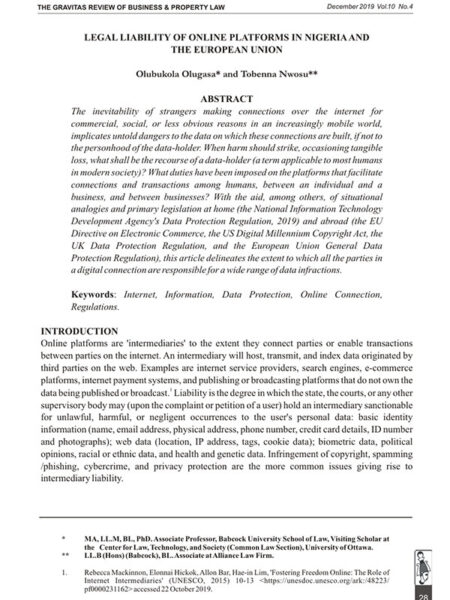
Legal Liability of Online Platforms in Nigeria and the European Union
0₦2,500.00Dr Olubukola Olugasa, Associate Professor of Law at Babcock University, and Tobenna Nwosu in their article, Legal Liability of Online Platforms in Nigeria and the European Union, review the liability of hosting platforms for breach of data privacy and losses arising therefrom. They examine Nigeria’s legal regime on data protection and the EU Directive on Electronic Commerce, the US Digital Millennium Copyright Act, the UK Data Protection Regulation, and the European Union General Data Protection Regulation. The authors delineate the extent to which all the parties in a digital connection are responsible for a wide range of data infractions.
-
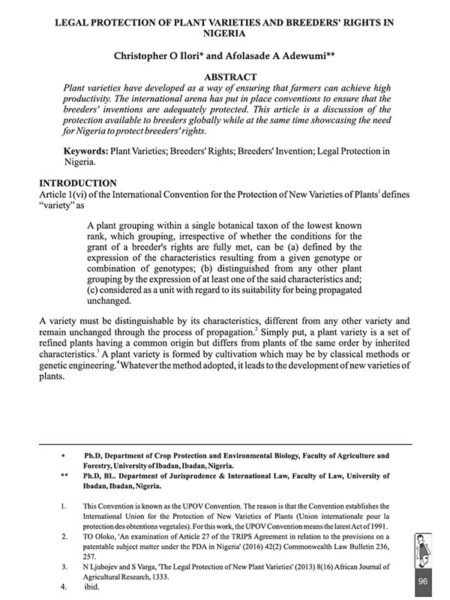
Legal Protection of Plant Varieties and Breeders’ Rights in Nigeria
0₦2,500.00Dr. Christopher Ilori of the Department of Crop Protection and Environmental Biology, University of Ibadan, and Dr. Afolasade Adewumi of the Department of Jurisprudence & International Law, University of Ibadan in their article, Legal Protection of Plant Varieties and Breeders’ Rights in Nigeria consider Intellectual Property Rights in the context of protection of plant varieties and breeders’ inventions. They analyse the nature and the need to protect plant varieties, the Nigerian and international legal regimes for the protection of plant varieties and breeders’ rights including a discussion of plant varieties protection under the Agreement on Trade-Related Aspects of Intellectual Property Rights, TRIPs.
-
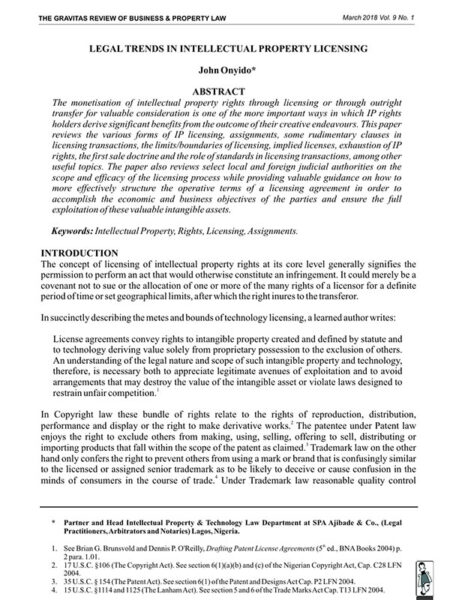
Legal Trends in Intellectual Property Licensing
0₦2,500.00John Onyido, Partner, SPA Ajibade & Co in his article, “Legal Trends in Intellectual Property Licensing”observes that the monetisation of intellectual property rights through licensing or through outright transfer for valuable consideration is one of the more important ways in which IP rights holders derive significant benefits from their creative. John reviews the various forms of IP licensing, assignments, some rudimentary clauses in licensing transactions, the limits/boundaries of licensing, implied licenses, exhaustion of IP rights, the first sale doctrine and the role of standards in licensing transactions, among others. He considers select local and foreign judicial authorities on the scope and efficacy of the licensing process while providing valuable guidance on how to more effectively structure the operative terms of a licensing agreement in order to accomplish the objectives of the parties.
-
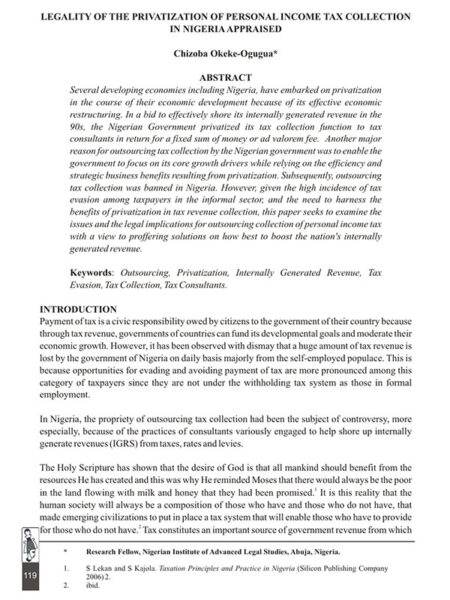
Legality of the Privatization of Personal Income Tax Collection in Nigeria Appraised
0₦2,500.00Chizoba Okeke-Ogugua, Research Fellow at the Nigerian Institute of Advanced Legal Studies Abuja Nigeria in her article, Legality of the Privatization of Personal Income Tax Collection in Nigeria Appraised, argues that though outsourcing of tax collection, which was rampant in the 1990s due to governments bid to shore up internally generated revenue, had been banned, given the high incidence of tax evasion among taxpayers in the informal sector, there are immense benefits in outsourcing tax collection in order to boost government revenue generation aggressively; with a caveat that measures must be implemented to monitor and supervise the activities of tax consultants or collectors.
-
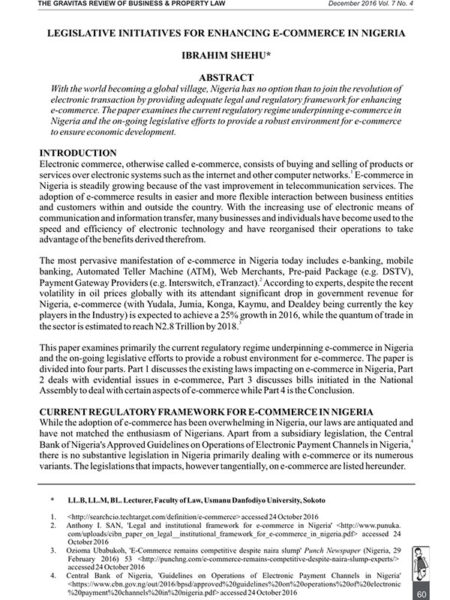
Legislative Initiatives for Enhancing E-Commerce in Nigeria
0₦2,500.00Ibrahim Shehu of the Faculty of Law, Usmanu Danfodiyo University, Sokoto in his article “Legislative Initiatives for Enhancing E-Commerce in Nigeria” considers some laws that impact on e-commerce in Nigeria. He argues that though there is no substantive legislation in Nigeria primarily dealing with e-commerce or its numerous variants, the Evidence Act 2011 has proven monumental in the development of e-commerce essentially in the admissibility of computer generated documents and recognition of electronic signatures. He examines some bills considered by the Seventh National Assembly which may remind the present Assembly of what needed to be done.
-
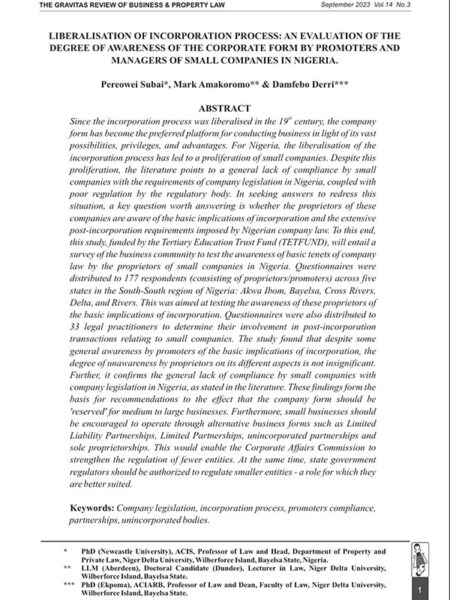
Liberalisation of Incorporation Process: An Evaluation of the Degree of Awareness of the Corporate Form by Promoters and Managers of Small Companies in Nigeria
0₦2,500.00Professor Pereowei Subai, Mark Amakoromo and Professor Damfebo Derri, in their article, Liberalisation of Incorporation Process: An Evaluation of the Degree of Awareness of the Corporate Form by Promoters and Managers of Small Companies in Nigeria, query the liberalisation of the incorporation process that has led to a proliferation of small companies. Backed by a field study, funded by the Tertiary Education Trust Fund (TETFUND), the authors postulate that despite some general awareness by promoters of the basic implications of incorporation, the degree of unawareness by proprietors on its different aspects of corporate personality is not insignificant. Further, the study confirms the general lack of compliance by small companies with company legislation in Nigeria. These findings form the basis for recommendations to the effect that the company form should be ‘reserved’ for medium to large businesses. Furthermore, small businesses should be encouraged to operate through alternative business forms such as Limited Liability Partnerships, Limited Partnerships, unincorporated partnerships and sole proprietorships. This would enable the Corporate Affairs Commission to strengthen the regulation of fewer entities. At the same time, state government regulators should be authorized to regulate smaller entities – a role for which they are better suited.
-
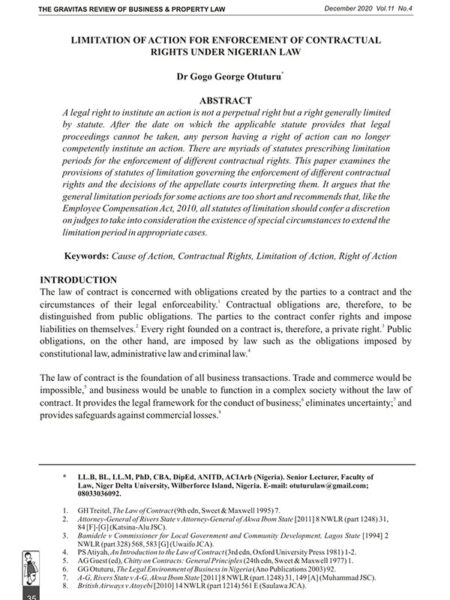
Limitation of Action for Enforcement of Contractual Rights Under Nigerian Law
0₦2,500.00Dr Gogo Otuturu, Senior Lecturer at the Faculty of Law Niger Delta University Wilberforce Island Nigeria In his article, Limitation of Action for Enforcement of Contractual Rights Under Nigerian Law, takes a tour of the Nigerian legal landscape to ferret out limitation of action in different contractual situations. Otuturu explores the limitation of action under general statutes, special statutes, simple and special contracts. He considers the accrual of a cause of action, postponement of limitation period, and concludes that the general limitation period for some actions are too short. He recommends that like the Employee Compensation Act 2010, all statutes of limitation should confer a discretion on judges to take into consideration the existence of special circumstances to extend the limitation period in appropriate cases.
The Gravitas Review of Business & Property Law



